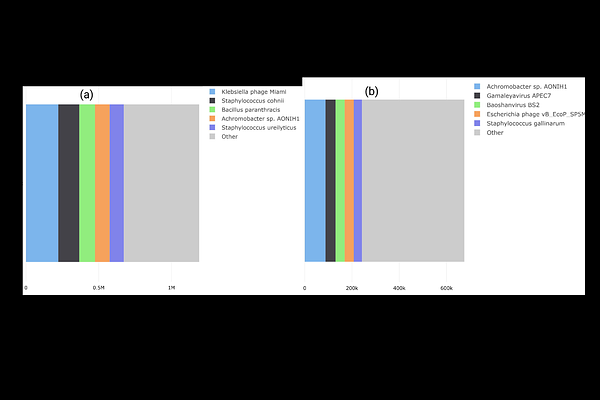Phage metagenome assembled genomes portraying anti-ESKAPE and anti CRISPR/Cas potential; datasets from sewage clinical settings of Western Uganda, subSaharan Africa

Phage metagenome assembled genomes portraying anti-ESKAPE and anti CRISPR/Cas potential; datasets from sewage clinical settings of Western Uganda, subSaharan Africa
Nabona, J.; Bahati, S.; Makaranga, A.; Njideka, A. C.; Neel, R.; Agbaje, A. B.; Eilu, E.; Mark, D.; Maghembe, R. S.
AbstractESKAPE pathogens include Enterococcus faecium, Staphylococcus aureus, Klebsiella pneumoniae, Acinetobacter baumannii, Pseudomonas aeruginosa and Enterobacter spp., which account for the major causes of mortality linked to the spread of infection and antimicrobial resistance (AMR) globally. Advances in omics approaches have pointed to bacteriophages as a promising alternative source of antibacterial agents. Here we enriched two samples from sewage and amplified them on Staphylococcus culture, followed by whole metagenome shotgun sequencing with Illumina NovaSe X. We performed metagenomic classification of high-quality sequence reads using the Kraken 2 database, to delineate the diversity and abundances of taxa. Thereafter we assembled the sequence reads with MAGAHIT and binned them with default parameters of the Bacterial and Viral Bioinformatics Resource Center (BV-BRC) before annotating each bin with PhageScope. From assembly, we recovered multiple metagenome-assembled genomes (MAGs) including Alistipes phage, Escherichia phage, Vibrio phage, Staphylococcus phage, Klebsiella phage and Acinetobacter phage, to mention the top six best hits. From annotation, while the Acinetobacter phage is virulent, the two Klebsiella phage and Staphylococcus phage are temperate. All the phages possess more than four lysis genes, with the potential to disrupt bacterial membranes. Exceptionally, Vibrio phage, Acinetobacter phage and Alistipes phage possess anti-CRISPR genes, the potential to counteract normal bacterial immune response to phage infection. These findings also inform that MAGs from the sewage have the potential to recover phages with anti-CRISPR/Cas activity, which is one of the desirable attributes for effective phage-bacterial infection to control the growth and multiplication of bacteria. Our datasets can be utilized for genome-guided selection of potent phages through lytic and host-range assays, towards the purification of endolysins (lysozymes) as alternative antibacterial agents.